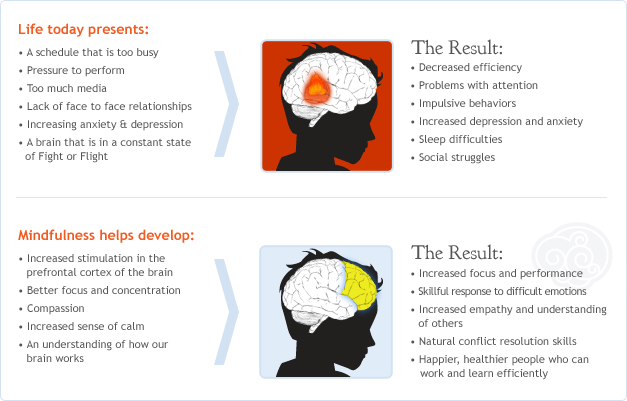

It shows him how to escape the warnings of his conscience with pleasurable feelings-to make himself feel good even when he has done or experienced something that he ought to feel bad about. While MindUP claims to be teaching non-judgmental awareness of thoughts and feelings, it actually teaches a child to judge any thought or feeling besides optimism and happiness as bad. When he acts in accordance with his sense of what is right, he grows in moral character, and develops greater self-control. A child must make judgements to choose between right and wrong actions. To teach a child to practice non-judgmental awareness is to risk interfering with the child’s ability to heed his sense of right and wrong. Teachers of MindUP are exposing children to these potential dangers. Many people who practice meditation have encountered unexpected negative side effects such as a sensation of being disconnected from one’s body or from reality, among other frightening reactions. Mindfulness meditation such as this can be a way of bringing the mind into an altered state of consciousness. Teachers are encouraged to use this core practice several times a day.

The chime can gradually evoke a conditioned response in the children, as similar tools do in Buddhist monks.

They are to direct their attention to the sound of the chime and focus intently on their breathing. In MindUP, the teacher strikes a Zenergy chime, and students are generally asked to sit cross legged, palms up and eyes closed. The “core practice” taught in MindUP is akin to certain forms of Buddhist-style mindfulness meditation including Anapanasati and Samadhi. Rather than help him develop self-control, it trains him to manipulate his mind and manipulate others to get pleasurable feelings for himself. The truth is that MindUP can interfere with a child’s innate self-regulator, the conscience, impeding his moral development and thus his ability to learn. This is all purported to help them to be better able to learn. Hawn’s curriculum is also supposed to make children feel happier and more optimistic. MindUP is marketed to teachers as a means of helping children to develop self-regulation, which is another way of saying “self-control.” The program’s “core practice” involves teaching children focused breathing techniques while they also practice non-judgmental awareness of their thoughts, which is supposed to help them calm down and be less anxious. “Self-regulation” is the latest buzz word in education, and the MindUP curriculum for schools, conceived by actor Goldie Hawn, capitalizes on it. I hope this debate provides food for thought about how to best encourage healthy social and emotional development in our children. Please also read a response to this critique, posted separately, from MindUP’s Rebecca Calos. Editor’s note: The following is a critique of a social and emotional learning program called MindUP that I have covered in other blogs (see list below) and in a feature in Scientific American Mind (visit “ Schools Add Workouts for Attention, Grit and Emotional Control”).


 0 kommentar(er)
0 kommentar(er)
